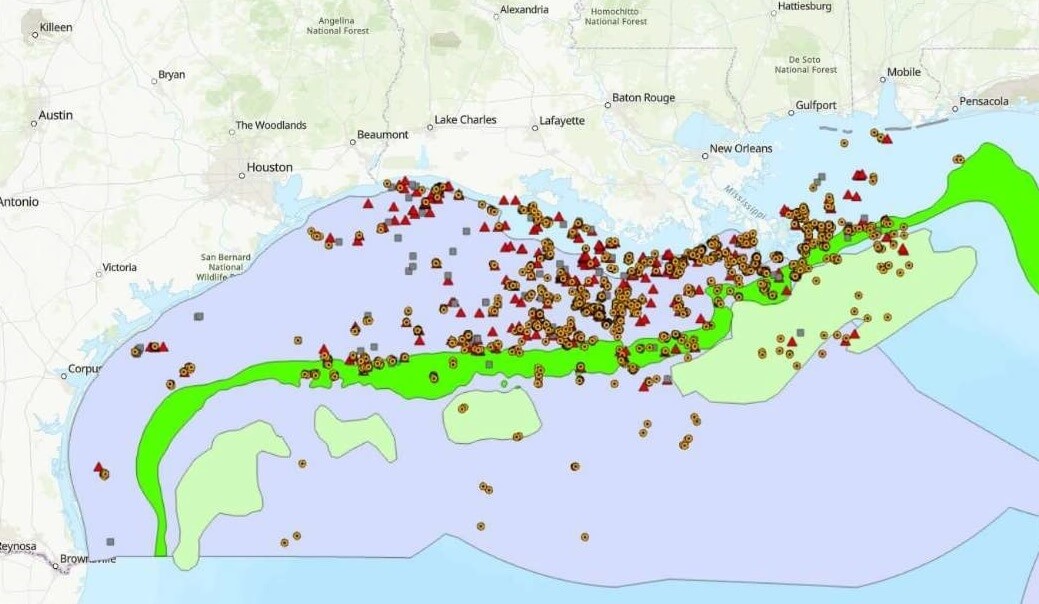Environmental Group Sues BOEM to Tighten Up Offshore Decommissioning
On Thursday, an environmental NGO sued the U.S. Department of the Interior over the unexamined risks of overdue decommissioning for thousands of inactive offshore oil and gas wells in the Gulf of Mexico, the overwhelming majority found in shallower waters off Louisiana.
According to the Government Accountability Office (GAO), as of last year there were about 2,700 disused wells and 500 offshore platforms in the Gulf that were past due for decommissioning, representing about 75 percent of all end-of-lease and idle infrastructure in the region. About 800 of these wells are "idle" and have not been used in a decade or more; about 600 have never been temporarily plugged, according to CBD.ds

The red triangles are the locations of pipelines decommissioned in place, the gray boxes are platforms overdue for decommissioning, and the orange circles are wells overdue for decommissioning. Bright green area: Rice’s whale habitat, light green: sperm whale core habitat, purple: logger head critical habitat. (CBD)
In a report issued earlier this year, GAO concluded that Interior's Bureau of Safety and Environmental Enforcement (BSEE) was "ineffective" in enforcing the rules for cleaning up old offshore oil and gas sites.
"BSEE’s administrative enforcement tools and its use of them are ineffective at incentivizing noncompliant operators—for example, citations for regulatory violations and orders to comply are essentially warnings," wrote GAO. "BSEE rarely takes more punitive actions such as issuing civil penalty fines, which can take years, or disqualifying operators, which has unclear trigger criteria."
GAO also criticized Interior's Bureau of Ocean Energy Management (BOEM) - its offshore leasing and regulation arm - for failing to make sure that offshore operators set aside enough money to pay for decommissioning. BOEM holds about $3.5 billion in bonds to cover potential cleanup liabilities of $40-70 billion, and the taxpayer could be on the hook for site remediation if the operator cannot pay.
"Interior could better enforce decommissioning deadlines and mitigate the safety, environmental, and financial risks that unmet decommissioning obligations pose by ensuring BSEE and BOEM prioritize completing planned actions," concluded GAO in its report.
BSEE also allows operators to use "decommissioning in place" for the massive web of disused oil and gas pipelines on the Gulf's seabed, and GAO has concluded that the agency has not adequately studied the impact of these abandoned lines. About 97 percent of all decommissioned pipeline mileage in the Gulf oil patch remains in place, according to GAO - without monitoring or inspection to assure that the phased-out pipelines are cleaned up.
In its new lawsuit, the Center for Biological Diversity claims that the Department of the Interior is skipping over a requirement of the National Environmental Policy Act: the need to study the impact of proposed decisions on the environment, like the decisions BSEE and BOEM make in regulating offshore decommissioning.
"Interior needs to take a hard look at how old leaky wells, rusty platforms and corroding pipelines put the ocean ecosystem at constant risk of spills and other harms. Private companies shouldn’t be allowed to make huge amounts of money drilling in public waters and then leave a wasteland for taxpayers," said Kristen Monsell, oceans legal director at the Center for Biological Diversity.
According to the NGO, Interior last studied the impact of Gulf oil and gas decommissioning in 2005, and did not consider whether the legal deadlines for cleanup would be met. The agency's analysis - now 20 years old - does not address delayed decommissioning and any associated risks to endangered species, nor the risk of methane leaks, which are a potent source of greenhouse gas emissions.

that matters most
Get the latest maritime news delivered to your inbox daily.
The lawsuit seeks to compel Interior to re-do its analysis of the impacts of oil and gas decommissioning and to pay for CBD's attorneys' fees.
Separately, Interior faces a related lawsuit brought by the states of Texas, Louisiana and Mississippi over the agency's efforts to require more financial assurance for decommissioning and cleanup liabilities, particularly from smaller independent operators with limited resources. If implemented, the new rule would require industry players to put down another $7 billion in guarantees to assure that offshore infrastructure is properly decommissioned. These three states object to the requirement for more financial guarantees, and have sued in federal court to block it. In an interview with Reuters, Louisiana Attorney General Liz Murrill called Interior's new rule "a really egregious direct assault on intermediate level producers of oil and gas."
